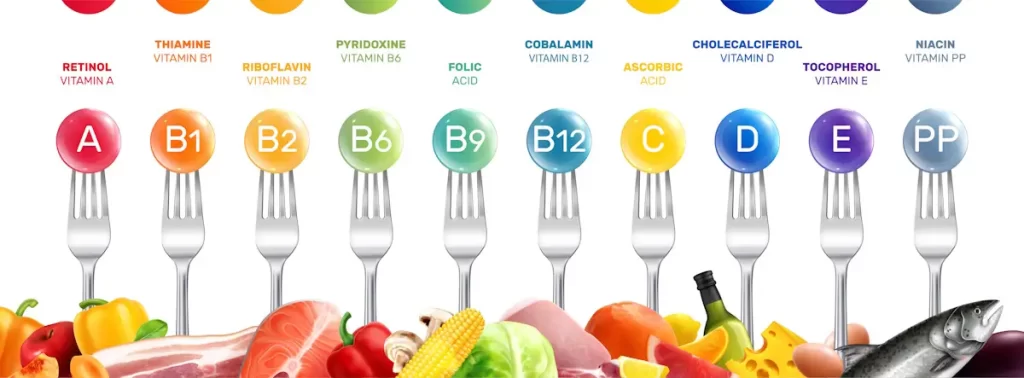Are you confused about which vitamins and minerals your body needs? These tiny nutrients help your body grow, heal, and stay strong. This blog will explain how they work, the best sources, and if supplements are right for you.
Thank you for reading this post, don't forget to subscribe!Keep reading to boost your health knowledge!
Key Takeaways
- Vitamins and minerals are vital for energy, strong bones, immunity, and overall health. A balanced diet with fruits, vegetables, whole grains, and proteins helps meet these needs.
- Water-soluble vitamins like B-complex and Vitamin C need daily replenishment since they leave the body through urine. Fat-soluble vitamins (A, D, E, K) store in fat tissue but can become toxic in excess.
- Minerals like calcium support bone strength while trace minerals like zinc aid wound healing. Iron-rich foods help carry oxygen through blood; bananas are high in potassium for heart health.
- Supplements may be necessary for pregnant women (folic acid), vegans (B12), or people with deficiencies like vitamin D from lack of sunlight. Always consult a doctor before use.
- Over-supplementing can harm your body. For example, too much vitamin A or iron causes toxicity risks. Focus on getting nutrients naturally from fresh food sources to avoid issues!
The Role of Vitamins and Minerals in the Body
Vitamins and minerals keep your body working properly. They support growth, energy production, and overall health.
Essential functions of micronutrients
Micronutrients like vitamins and minerals support vital body functions. They help with energy production, blood clotting, and immune health. For example, vitamin C boosts the immune system, while iron supports red blood cells and oxygen transport.
B-complex vitamins help metabolize food into energy.
Fat-soluble vitamins (A, D, E, K) store in fat tissues for long-term use. Water-soluble vitamins like vitamin C and B-complex need daily replenishment since they leave the body through urine.
Minerals such as calcium strengthen bones, while trace minerals like zinc contribute to wound healing. A healthy diet ensures you meet these needs without risking imbalances or deficiencies.
Impact on overall health and wellness
Vitamins and minerals help your body stay healthy. They support energy production, immune system strength, blood clotting, and bone health. For example, vitamin D improves calcium absorption for strong bones.
Vitamin C boosts immunity and helps repair tissues.
Antioxidants found in nutrients like vitamin E protect cells from damage. Folic acid prevents birth defects, such as spina bifida, during pregnancy. A balanced diet with whole grains, green leafy vegetables, citrus fruits, and fortified foods ensures proper nutrient intake for overall well-being.
Good nutrition is a foundation for good health.

Types of Vitamins
Vitamins help your body work properly. They can dissolve in water or fat, and each kind works differently to keep you healthy.
Water-soluble vitamins
Water-soluble vitamins play a key role in keeping your body healthy. They dissolve in water and do not get stored, so you need them daily.
- Vitamin C helps with collagen production, immune system support, and wound healing. Adults need 75 mg (women) or 90 mg (men) per day. Citrus fruits like oranges are great sources.
- B-complex vitamins include B1 (thiamine), B2 (riboflavin), B3 (niacin), B5 (pantothenic acid), B6, B7 (biotin), B9 (folic acid), and B12. Each has unique benefits, such as energy production and red blood cell formation.
- Thiamine supports energy from food. Whole grains and fortified foods contain this nutrient.
- Riboflavin aids cell growth and repair. Dairy products provide this essential vitamin.
- Niacin promotes healthy skin and nerves while improving digestion. Meats are rich in niacin.
- Pantothenic acid converts fats into energy. You can find it in balanced diets with whole grains and vegetables.
- Vitamin B6 is critical for brain development and immune health. It’s present in green leafy vegetables, bananas, and chicken.
- Folic acid prevents neural tube defects during pregnancy. Fortified cereals and green veggies supply folic acid.
- Vitamin B12 supports nerve function and red blood cells. Vegetarians may need supplements since it’s found in meat, fish, eggs, and dairy.
- Small amounts of these vitamins travel through the bloodstream to be used where needed before being excreted through urine.
Fat-soluble vitamins
Unlike water-soluble vitamins, fat-soluble vitamins need fat to be absorbed and stored. They include vitamins A, D, E, and K—all important for your body’s needs.
- Fat-soluble vitamins are stored in the liver and fat tissues when not immediately used. This storage helps maintain levels for future use, but too much can lead to toxicity.
- Vitamin A supports healthy vision and cell growth. Think of foods like carrots or sweet potatoes that are rich in this nutrient.
- Vitamin D is key for bone health as it helps absorb calcium. You can get it from sunlight or foods like fortified milk and fish.
- Vitamin E acts as an antioxidant, protecting cells from damage caused by free radicals. Nuts, seeds, and green vegetables are great sources for this vitamin.
- Vitamin K plays a role in blood clotting and bone development. You can find it in leafy greens like spinach or kale.
- These vitamins enter the bloodstream through lymph channels after digestion with the help of bile—a substance made by your liver.
- Excess amounts generally come from overuse of supplements rather than food intake, so careful dietary intake matters.
These vital nutrients work in specific ways to keep you healthy—but balance is key!
Types of Minerals
Minerals keep your body working properly. They help with things like strong bones, energy, and staying healthy.
Major minerals
Major minerals are nutrients your body needs in larger amounts. They help with many functions, like bone health and water balance.
- Calcium keeps bones strong and helps blood clot properly. Dairy products, green leafy vegetables, and fortified foods are rich sources.
- Chloride supports fluid balance and digestion by making stomach acid. Table salt is the main source for this mineral.
- Magnesium plays a role in energy production and muscle function. Whole grains, nuts, seeds, and legumes provide good amounts of it.
- Phosphorus works with calcium to build healthy teeth and bones. It’s found in meat, dairy, fish, eggs, and whole grains.
- Potassium helps regulate blood pressure and maintain fluid balance in cells. Bananas, citrus fruits, potatoes, and spinach are common sources.
- Sodium controls nerve signals and fluid levels in the body but should not exceed daily value limits due to risks of high blood pressure.
- Sulfur is essential for protein stabilization and certain vitamins like thiamine (B1). Protein-rich foods such as fish, poultry, eggs, garlic help meet sulfur needs.
Too much of one can cause imbalances with others—for example, excess sodium can lower potassium levels or vice versa! Avoid megadoses unless prescribed for specific conditions like deficiencies or iron metabolism disorders linked to heart disease risks or bone health issues needing special care over both adequate intake yet avoiding toxicity caused through well-balanced dietary supplements sparing gastrointestinal tract stress
Trace minerals
Trace minerals play a big role in keeping your body working well. They are needed in tiny amounts but support many important processes.
- Iron helps carry oxygen through your blood. It’s found in red meat, spinach, and fortified foods.
- Zinc aids blood clotting, healing wounds, and boosting the immune system. You can get it from whole grains, nuts, and shellfish.
- Fluoride strengthens bones and prevents tooth decay. It is added to water supplies and found in seafood.
- Copper supports enzyme creation and iron transport in the body. Foods like nuts, seeds, and green leafy vegetables provide it.
- Manganese assists with energy production and bone health. Whole grains, beans, and tea are great sources.
- Selenium protects cells from damage with its antioxidant properties. Brazil nuts are an excellent option for selenium intake.
- Iodine ensures proper thyroid function and helps prevent birth defects during pregnancy. You’ll find it in iodized salt and seaweed products.
- Chromium regulates blood sugar levels by improving how insulin works. Lean meats and whole grains contain chromium.
- Molybdenum helps process proteins in the body—examples include milk or legumes like lentils for dietary intake.
Excessive trace mineral consumption may cause harm instead of good by creating imbalances or worsening deficiencies!

Do You Need Supplements?
Sometimes, your diet might not give you all the nutrients you need. In these cases, supplements like vitamin pills or mineral tablets can help fill the gaps.
When supplements may be necessary
Diet alone may not meet all nutritional requirements for some people. Pregnant women often need folic acid to lower the chance of birth defects like spina bifida. Those with vitamin D deficiency, common in colder climates or darker months, might need supplements for bone health and immune system support.
Vegans and vegetarians may require vitamin B12 since it mostly comes from animal foods.
Certain health conditions also demand extra nutrients. For example, digestive issues affecting the small intestine can limit absorption of essential vitamins and minerals. Aging adults may struggle to absorb enough calcium or B-complex vitamins due to changes in their intestinal wall function.
Always consult a doctor before taking any vitamin pills or mineral supplements….
Risks of over-supplementation
Taking too many vitamin and mineral supplements can harm your body. Water-soluble vitamins, like B6, might cause nerve damage if consumed in excess. Fat-soluble vitamins, such as vitamin A and vitamin D, can build up in the body over time and become toxic.
This happens because the body stores them instead of flushing them out.
Over-supplementing with minerals brings its own risks. Taking too much iron may lead to iron toxicity, while excessive manganese could worsen an iron deficiency. High doses of certain antioxidants from supplements have been linked to increased health risks rather than benefits—unlike natural sources from green leafy vegetables or citrus fruits.
Always balance your dietary intake carefully to avoid these problems.
Best Food Sources for Vitamins and Minerals
A balanced diet gives you the vitamins and minerals your body needs. Eating a variety of fresh, whole foods keeps meals nutritious and satisfying.
Foods rich in vitamins
Vitamins are vital for your health. Eating the right foods can provide these essential nutrients.
- Green leafy vegetables like spinach and kale are packed with vitamin K, folic acid, and many B vitamins. These support blood clotting and cell growth.
- Citrus fruits such as oranges and lemons offer high amounts of vitamin C, which boosts the immune system and helps fight colds.
- Carrots, sweet potatoes, and pumpkins are excellent sources of vitamin A. This vitamin is great for eye health and skin.
- Whole grains like oatmeal and brown rice contain B-complex vitamins, including vitamin B6 and B3. These help with energy production.
- Eggs contain vitamin D, which supports bone health by helping the body absorb calcium effectively.
- Nuts like almonds are rich in vitamin E, an antioxidant that protects cells from damage caused by free radicals.
- Fatty fish such as salmon has both vitamin D and omega-3 fatty acids, good for heart health.
- Dairy products like milk and yogurt are fortified with vitamins A and D to promote strong bones.
- Fortified foods like cereals often include several vitamins like B12 or folic acid to prevent deficiencies during daily dietary intake.
- Avocados provide a good amount of B vitamins, especially vitamin B6, which helps produce red blood cells.
Eating a mix of these foods ensures you get all the vitamins needed for a healthy diet!
Foods high in minerals
Minerals are vital for good health. Many foods provide these nutrients naturally.
- Green leafy vegetables – Spinach, kale, and collard greens offer magnesium, calcium, and iron. These help with bone health and red blood cells.
- Whole grains – Brown rice, quinoa, and oatmeal supply magnesium and zinc for energy production and immune system support.
- Dairy products – Milk, cheese, and yogurt are rich in calcium for strong bones and teeth.
- Citrus fruits – Oranges and lemons contain potassium which aids in muscle function.
- Nuts and seeds – Almonds, sunflower seeds, and pumpkin seeds are full of magnesium, copper, and selenium for heart health.
- Seafood – Salmon, tuna, shrimp, and shellfish pack iodine for thyroid function plus zinc for healing wounds.
- Legumes – Beans like lentils or chickpeas offer iron to prevent deficiencies such as anemia.
- Fortified foods – Cereals or plant-based milk often have added minerals like calcium or iron to meet dietary intake needs.
- Bananas – This simple fruit is known for its high potassium content which helps the heart pump effectively.
- Eggs – A great source of phosphorous supporting healthy bones while being easy to cook.
These simple options make it easier to meet your daily nutritional requirements!
Malnutrition Alert: Stock Your Freezer With Healthy Foods
Frozen foods can help fight malnutrition. Stock your freezer with green leafy vegetables, whole grains, and citrus fruits. These are rich in vitamins like vitamin C, folic acid, and vitamin K.
They also support blood clotting, energy production, and bone health.
Choose healthy options like fortified foods or frozen meals packed with nutrients. Avoid items high in salt or sugar. Keeping these ready-to-eat choices will make sticking to a balanced diet easier for any busy lifestyle….
Conclusion
Vitamins and minerals keep your body strong and healthy. They support energy, bones, immunity, and more. A balanced diet with fruits, vegetables, whole grains, and proteins can meet most needs.
Supplements help sometimes but use them wisely. Make smart food choices—your health depends on it!
